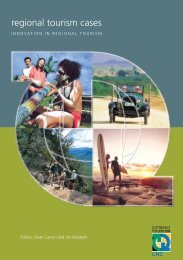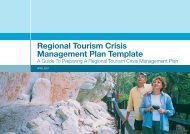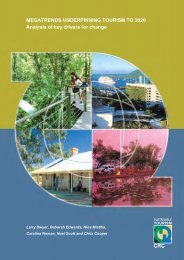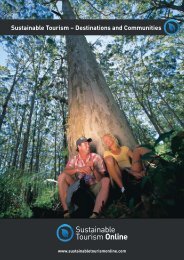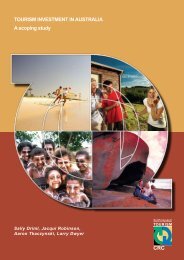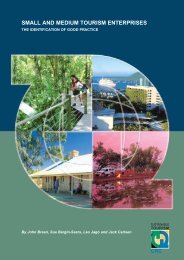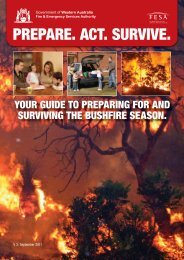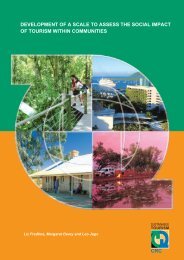Tourism Risk Management - Sustainable Tourism Online
Tourism Risk Management - Sustainable Tourism Online
Tourism Risk Management - Sustainable Tourism Online
You also want an ePaper? Increase the reach of your titles
YUMPU automatically turns print PDFs into web optimized ePapers that Google loves.
A) Image building communications<br />
• Be proactive in communications<br />
Promote what you are doing to restore tourism to normalcy. Brief journalists on your recovery plans<br />
and how long it will take for them to have effect. Provide plentiful information, including copies of<br />
speeches, editorial pieces, maps and photos. Recovery from a crisis requires extra budgetary and<br />
human resources allocated to communication.<br />
• Look for positive news<br />
Gear news items to reflect the normalcy of tourism activity, for example, the arrival of specialized tour<br />
groups or the opening of new attractions. The goal is to demonstrate ‘business as usual’ in your<br />
destination. Egypt has effectively promoted the discovery or reopening of archaeological sites as part<br />
of its recovery strategy. Promote news not directly related to tourism, such as cultural events,<br />
scientific discoveries, sporting triumphs, film shoots and shopping trends.<br />
• Increase familiarization trips for journalists<br />
Invite the press back to show them what has been achieved. Target the theme of the familiarization<br />
trip to address your particular image problem and make sure it includes plenty of contact between<br />
journalists and local residents. Concentrate on positive television coverage to counteract the harmful<br />
effect of TV images of the crisis in the minds of potential visitors. The great thing about familiarization<br />
trips is that they allow plenty of time to establish relationships with individual journalists who may then<br />
be motivated to take a special interest in your country for years to come.<br />
• Remember anniversaries<br />
An area which has suffered a major crisis will be revisited by the media on key anniversaries - 100<br />
days, six months, one year, two years, and ten years. These dates offer a good opportunity to<br />
communicate, so be prepared with materials and stories that reflect the recovery of the destination.<br />
• Anticipate legal actions<br />
People affected by international incidents will lobby for investigations, make complaints and pursue<br />
lawsuits. If the media reports something inaccurate about you, write a letter to the editor to correct<br />
the matter. If someone takes you to court, the inaccurate media report could be produced as<br />
evidence and it does no good to claim it was not true. You will need evidence that you corrected the<br />
report at the time.<br />
• Create your own news outlet on the destination website<br />
Provide an alternative to mass media news sources on your own website. Make the website as<br />
newsy as possible, taking advantage of its unlimited space to provide in-depth information. To<br />
demonstrate that your website is providing up-to-date information it needs to include the day’s date in<br />
a prominent place. It should also be updated daily with positive stories that demonstrate a return to<br />
normalcy.<br />
80 <strong>Tourism</strong> <strong>Risk</strong> <strong>Management</strong> – An Authoritative Guide to Managing Crises in <strong>Tourism</strong>



